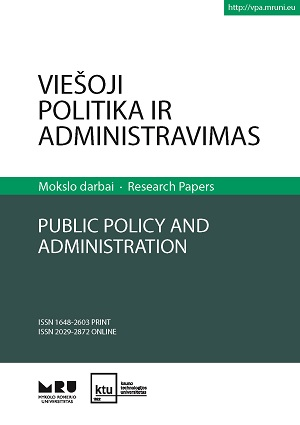Skaitymo skatinimo prоgramų rezultatų ir poveikio vertinimas
Outcomes and impact evaluation of reading promotion programmes
Author(s): Laura Lukoševičiūtė, Audronė RimkuteSubject(s): Library and Information Science, Library operations and management
Published by: Mykolas Romeris University
Keywords: Reading promotion; evaluation of cultural programmes; impact of culture; library management; cultural policy;
Summary/Abstract: In recent decades, national reading promotion programmes in many developed countries have become a particularly relevant task of education and culture policy, the solution of which is expected to contribute to social cohesion and the development of population’s information literacy and critical thinking. As the popularity of these programs grows, so does research on their outcomes and impact, which aims both to develop an appropriate methodology for evaluating these programs and to obtain data to improve their measures. In Lithuania, reading promotion programmes have been organised since 2006, but systematic evaluation of their results and impact is not carried out. Thus, there is no data on whether these programs achieve their goal or what their results and impact are. The purpose of this article is to discuss the peculiarities of the evaluation of reading promotion programs, to present the conceptual model of their evaluation and to discuss the results of the research of the reading promotion project “Summer with a Book”. “Summer with a book” is the most popular project of reading promotion in Lithuania that attracts the largest number of participants and can have a significant impact on the popularity of reading in general. During the research, a qualitative analysis of the documents of the project, a quantitative and qualitative analysis of the books read during the project, and a quantitative survey of the participants were carried out. Documents were analysed in order to evaluate the relevance of the project, defining the relevance as links between the defined objectives and the existing reading problems to be solved by the project. The analysis showed that the description of the reading situation in Lithuania presented in the reading promotion programme emphasises the decrease in both the number of readers and the quality of reading. “Summer with a book”, however, is aimed only at increasing the number of people reading, without raising objectives related to the quality of reading. This conclusion is also confirmed by the quantitative and qualitative analysis of the titles of the books read and registered during the project. The survey of “Summer with a book” participants was conducted in order to evaluate the effectiveness of this measure defining effectiveness as a comparison of actual and planned outputs, results, and impacts. The “Summer with a book” is presented in the Ministry’s programme as a project designated for non-reading and lowreading members of society. However, the survey showed that the project is more popular amongpeople who read a lot than among those who read little or not at all.promotion project “Summer with a Book”. “Summer with a book” is the most popular project of reading promotion in Lithuania that attracts the largest number of participants and can have a significant impact on the popularity of reading in general. During the research, a qualitative analysis of the documents of the project, a quantitative and qualitative analysis of the books read during the project, and a quantitative survey of the participants were carried out. Documents were analysed in order to evaluate the relevance of the project, defining the relevance as links between the defined objectives and the existing reading problems to be solved by the project. The analysis showed that the description of the reading situation in Lithuania presented in the reading promotion programme emphasises the decrease in both the number of readers and the quality of reading. “Summer with a book”, however, is aimed only at increasing the number of people reading, without raising objectives related to the quality of reading. This conclusion is also confirmed by the quantitative and qualitative analysis of the titles of the books read and registered during the project. The survey of “Summer with a book” participants was conducted in order to evaluate the effectiveness of this measure defining effectiveness as a comparison of actual and planned outputs, results, and impacts. The “Summer with a book” is presented in the Ministry’s programme as a project designated for non-reading and lowreading members of society. However, the survey showed that the project is more popular amongpeople who read a lot than among those who read little or not at all.
Journal: Viešoji politika ir administravimas
- Issue Year: 22/2023
- Issue No: 1
- Page Range: 117-131
- Page Count: 15
- Language: Lithuanian

